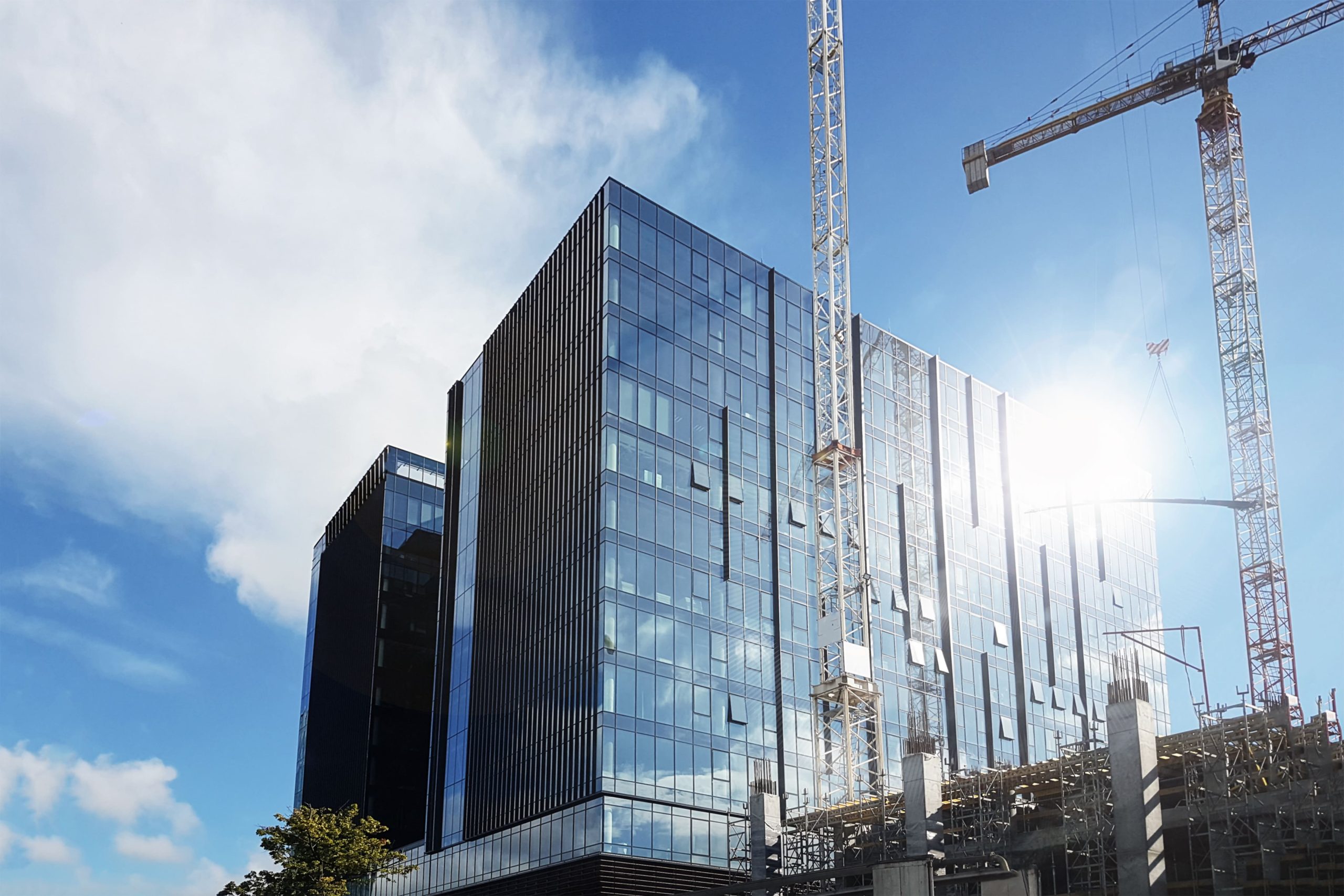Market Overview
As of 2024, the Qatar modular construction market is valued at USD 1.5 billion, with a growing CAGR of 6.4% from 2024 to 2030, reflecting a significant increase from previous years, driven by rapid urbanization and infrastructure development projects. The demand for modular solutions is propelled by the need for cost efficiencies, speed, and sustainability in construction practices. Additionally, the country’s investments in World Cup-related infrastructure further exemplify the rising need for innovative construction methods.
Key cities dominating the market include Doha, Al Rayyan, and Al Wakrah, largely due to their strategic locations, high population densities, and robust governmental support for infrastructure development. Doha, being the capital, has seen substantial investment in commercial, residential, and public buildings, while Al Rayyan and Al Wakrah are emerging as pivotal urban centers due to ongoing development projects and initiatives that promote modern construction techniques.
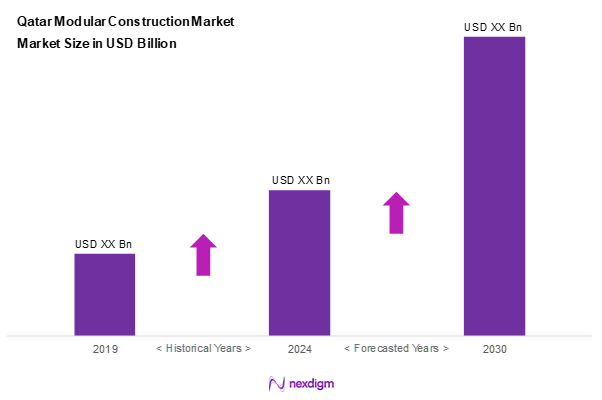
Market Segmentation
By Type of Construction
The Qatar modular construction market is segmented into volumetric modular construction, panel-based construction, hybrid modular construction, and other types. Volumetric modular construction holds a dominant market share, primarily due to its efficiency, reduced construction time, and lower labour costs. It allows for components to be manufactured offsite and assembled quickly onsite, aligning with Qatar’s need for rapid response in infrastructure development to support its economic activities and events like the FIFA World Cup.
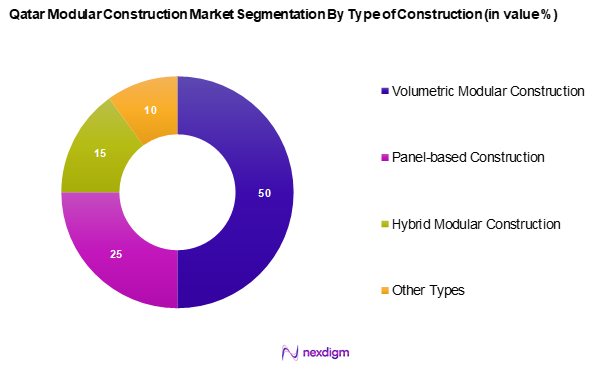
By End-Use Sector
The Qatar modular construction market is segmented into residential, commercial, industrial, educational, and healthcare. The residential segment dominate the market, driven by a robust demand for housing amidst rapid population growth and urbanization. The government’s initiatives to improve living standards and provide affordable housing further reinforce the prominence of this segment, making it a focal point for modular construction solutions.
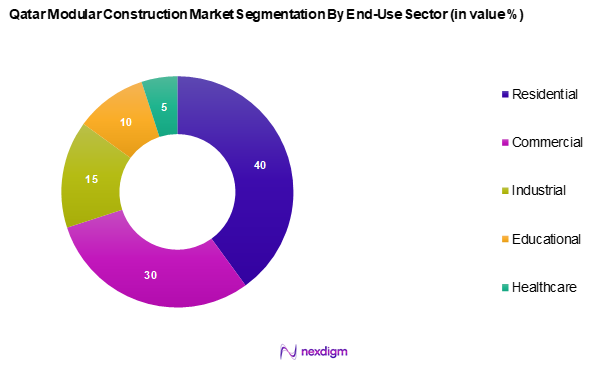
Competitive Landscape
The Qatar modular construction market is characterized by a competitive landscape involving major players such as Domopan and Qatar Speed House. This consolidation underscores the influence and market presence of key companies working in the modular construction sector.
| Company Name | Establishment Year | Headquarters | Market Segment | Annual Revenue (USD) | No. of Projects | Market
Share |
| Domopan | 2006 | Doha, Qatar | – | – | – | – |
| SHELTER Group | 1972 | Doha, Qatar | – | – | – | – |
| Qatar Speed House | 2001 | Doha, Qatar | – | – | – | – |
| Desert Line Group | 2004 | Doha, Qatar | – | – | – | – |
| TSSC Group | 1975 | Dubai, U.A.E. | – | – | – | – |
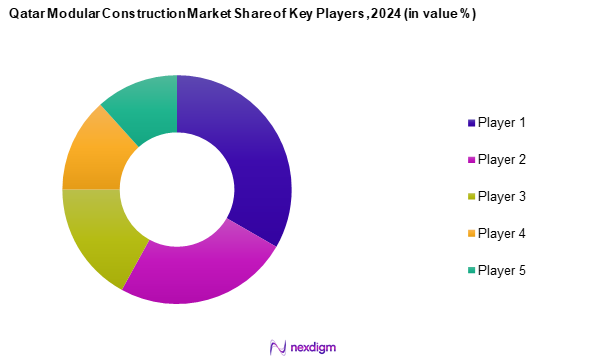
Qatar Modular Construction Market Analysis
Growth Drivers
Urbanization
Qatar is experiencing a rapid pace of urbanization, which is significantly boosting the demand for modular construction. The government’s strategy includes major investments in infrastructure to support the expanding urban population. Projects like new city developments exemplify the nation’s commitment to building modern, livable spaces. Modular construction aligns well with this urban expansion by offering a fast and sustainable alternative to traditional building methods, helping to meet growing housing needs while keeping construction timelines short and manageable.
Cost Efficiency and Time Savings
Modular construction has gained traction in Qatar due to its ability to reduce construction costs and speed up project delivery. As labor and material expenses continue to rise, the need for cost-effective building solutions becomes even more pressing. Modular techniques minimize waste, optimize resource usage, and require fewer on-site labor hours. These efficiencies allow developers to bring projects to market faster, an advantage in a country where there is a constant demand for residential, commercial, and institutional facilities.
Market Challenges
Regulatory and Compliance Issues
One of the key hurdles for modular construction in Qatar lies in navigating the complex regulatory environment. The construction industry is governed by a wide range of building codes and standards that are frequently updated. Adapting to these evolving regulations can be challenging, especially for firms unfamiliar with the local legal framework. Delays caused by permitting issues or non-compliance can affect project timelines.
Public Perception and Acceptance
Cultural preferences in Qatar continue to favor traditional construction methods, posing a challenge for the adoption of modular solutions. There remains a degree of skepticism among the public regarding the quality, durability, and aesthetics of modular buildings. This perception has slowed the pace of adoption, particularly in residential projects.
Opportunities
Technological Innovations
Qatar’s push toward modernization and smart construction practices is creating fertile ground for technological innovations in modular construction. The adoption of digital tools like Building Information Modeling (BIM) and the use of automation in construction workflows are streamlining operations and improving project outcomes. These advancements allow for greater precision, fewer delays, and enhanced coordination among stakeholders, giving modular construction firms a competitive edge in delivering high-quality, efficient builds.
Expansion into Emerging Sectors
The modular construction sector is poised for growth beyond residential and commercial real estate. Emerging sectors such as healthcare and education present new opportunities, as they increasingly require rapid deployment of facilities. Modular buildings offer the adaptability and speed needed to address urgent infrastructure needs, particularly in growing areas. With the government prioritizing these sectors for development, modular construction is well-positioned to play a vital role in supporting national infrastructure goals.
Future Outlook
Over the next five years, the Qatar modular construction market is poised for significant growth, driven by urban development initiatives, government support for sustainable construction practices, and a rising demand for affordable housing. The integration of advanced technologies, such as Building Information Modeling (BIM) and automation in production processes, is expected to further enhance the efficiency and appeal of modular construction solutions.
Major Players
- Domopan
- SHELTER Group
- Qatar Speed House
- Desert Line Group
- TSSC Group
- Spacemaker
- Al Wasit Cabins
- COMO Modular Solutions
- Dalal Steel Industries
- Prefabex
- Skyline Champion Corporation
- Morton Buildings Inc.
- Clayton Homes
Key Target Audience
- Investors and Venture Capitalist Firms
- Government and Regulatory Bodies (Qatar Ministry of Municipality and Environment)
- Construction and Infrastructure Developers
- Real Estate Investment Trusts (REITs)
- International Construction Consortiums
- Engineering Firms
- Property Management Companies
- Urban Development Authorities
Research Methodology
Step 1: Identification of Key Variables
The initial phase involves constructing an ecosystem map encompassing all major stakeholders within the Qatar modular construction market. This step is underpinned by extensive desk research, utilizing a combination of secondary and proprietary databases to gather comprehensive industry-level information. The primary objective is to identify and define the critical variables that influence market dynamics.
Step 2: Market Analysis and Construction
In this phase, we compile and analyze historical data pertaining to the Qatar modular construction market. This includes assessing market penetration, the ratio of marketplaces to service providers, and the resultant revenue generation. Furthermore, an evaluation of service quality statistics will be conducted to ensure the reliability and accuracy of the revenue estimates.
Step 3: Hypothesis Validation and Expert Consultation
Market hypotheses will be developed and subsequently validated through Computer-Assisted Telephone Interviews (CATIs) with industry experts representing a diverse array of companies in the modular construction sector. These consultations will provide valuable operational and financial insights directly from industry practitioners, which will be instrumental in refining and corroborating the market data.
Step 4: Research Synthesis and Final Output
The final phase involves direct engagement with multiple modular construction manufacturers to acquire detailed insights into product segments, sales performance, consumer preferences, and other pertinent factors. This interaction will serve to verify and complement the statistics derived from the bottom-up approach, thereby ensuring a comprehensive, accurate, and validated analysis of the Qatar modular construction market.
- Executive Summary
- Research Methodology
(Market Definitions and Assumptions, Abbreviations, Market Sizing Approach, Consolidated Research Approach, Understanding Market Potential Through In-Depth Industry Interviews, Primary Research Approach, Limitations and Future Conclusions)
- Definition and Scope
- Overview Genesis
- Timeline of Major Players
- Business Cycle
- Supply Chain & Value Chain Analysis
- Growth Drivers
Urbanization
Cost Efficiency and Time Savings - Market Challenges
Regulatory and Compliance Issues
Public Perception and Acceptance - Opportunities
Technological Innovations
Expansion into Emerging Sectors - Trends
Increased Adoption of Smart Buildings
Integration of Off-Site and On-Site Construction - Government Regulation
Building Codes and Standards
Environmental Regulations - SWOT Analysis
- Stakeholder Ecosystem
- Porter’s Five Forces
- By Value, 2019-2024
- By Volume, 2019-2024
- By Average Project Size, 2019-2024
- By Type of Construction
Volumetric Modular Construction
– Fully Enclosed Units
– Pre-Fitted Interior Modules
– Multi-Story Stacking Units
Panel-Based Construction
– Wall Panels
– Floor Panels
– Roof Panels
Hybrid Modular Construction
– Combination of Volumetric and Panel Systems
– Core-and-Shell Integration
Other Types
– Flat-Pack Modular Systems
– 2D Element-Based Construction - By End-Use Sector
Residential
– Affordable Housing
– Labor Camps
– Villas and Townhouses
Commercial
– Retail Outlets
– Office Complexes
– Hotels and Serviced Apartments
Industrial
– Site Offices
– Oil & Gas Accommodation Units
– Utility Plant Buildings
Educational
– Modular Classrooms
– School Campuses
– Training Centers
Healthcare
– Clinics
– Mobile Hospitals
– Diagnostic Labs - By Materials Used
Steel
– Light Gauge Steel Frames
– Structural Steel Modules
Concrete
– Precast Concrete Panels
– Concrete Cores
Wood
– Cross-Laminated Timber (CLT)
– Glulam Timber Frames
Plastics
– PVC Panels
– Reinforced Composite Plastics
Others
– Aluminum
– Recycled Materials
– Smart Insulated Panels - By Region
Doha
Al Rayyan
Umm Salal
Al Wakrah
Al Khor
Al Daayen
Dukhan - By Project Delivery Method
Design-Bid-Build
– Traditional Modular Construction Flow
– Clearly Separated Roles
Design-Build
– Single Point Responsibility
– Fast-Track Modular Execution
Construction Management
– CM-at-Risk
– Agency CM Models
Integrated Project Delivery (IPD)
– Collaborative Modular Planning
– Shared Risk and Reward Structure - By Type
Permanent Modular
– Government Housing
– Commercial Infrastructure
Temporary Modular
– Event Structures
– Emergency Shelters
Relocatable Modular
– Military Units
– Mobile Classrooms and Clinics - By Modular
Four-Sided Modules
Mixed Modules and Floor Cassettes
Modules Supported by a Primary Structure
Open-Sided Modules
Partially Open-Sided Modules
- Market Share of Major Players on the Basis of Value/Volume, 2024
Market Share of Major Players by Type of Construction Segment, 2024 - Cross Comparison Parameters (Company Overview, Business Strategies, Recent Developments, Strengths, Weaknesses, Organizational Structure, Revenues, Revenues by Type of Construction, Number of Projects, Distribution Channels, Margins, Unique Value Proposition, and others)
- SWOT Analysis of Major Players
- Pricing Analysis Basis SKUs for Major Players
- Detailed Profiles of Major Companies
Domopan
SHELTER Group
Qatar Speed House
Desert Line Group
TSSC Group
Spacemaker (a subsidiary of Gulf Contracting Company (GCC))
Al Wasit Cabins
COMO Modular Solutions
Dalal Steel Industries
Prefabex
Skyline Champion Corporation
Morton Buildings Inc.
Clayton Homes
- Market Demand Dynamics
- Purchasing Power and Allocation
- Regulatory Compliance Impact
- Consumer Preferences and Pain Points
- Decision-Making Process
- By Value, 2025-2030
- By Volume, 2025-2030
- By Average Project Size, 2025-2030

